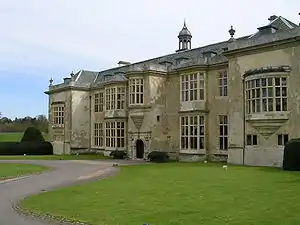Sir Thomas Lee, 3rd Baronet
Sir Thomas Lee, 3rd Baronet (1687–1749), of Hartwell, near Aylesbury, Buckinghamshire, was an English politician who sat in the House of Commons almost continuously from 1710 to 1741.

Lee wasthe eldest son of Sir Thomas Lee, 2nd Baronet, MP and the brother of George, John and William. He succeeded his father in 1702, inheriting the family seat at Hartwell, near Aylesbury, Buckinghamshire.[1]
Lee was returned unopposed as Member of Parliament for Chipping Wycombe at the 1710 general election. He was returned unopposed again for Wycombe in 1713 and 1715. At the 1722 general election he was elected instead as MP for Buckinghamshire. He did not stand at the 1727 general election but was returned as MP for Buckinghamshire at a by-election on 29 January 1729. He was elected again at the 1734 general election, but did not stand in 1741.[2]
Lee married in 1720, Elizabeth Sandys, the daughter and heiress of Thomas Sandys of London and had two sons and a daughter. He was succeeded by his second son William.
References
- Cokayne, George Edward, ed. (1903), Complete Baronetage volume 3 (1649-1664), 3, Exeter: William Pollard and Co, retrieved 9 October 2018
- "LEE, Sir Thomas, 3rd Bt. (1687-1749), of Hartwell, nr. Aylesbury, Bucks". History of Parliament Online (1715-1754). Retrieved 12 February 2018.
| Parliament of Great Britain | ||
|---|---|---|
| Preceded by Fleetwood Dormer Charles Godfrey |
for Chipping Wycombe 1710–1722 With: Charles Godfrey to 1713 Sir John Wittewronge, Bt 1713 – February 1722 John Neale February–March 1722 |
Succeeded by Charles Egerton The Earl of Shelburne |
| Preceded by Richard Hampden John Fleetwood |
Member of Parliament for Buckinghamshire 1722–1727 With: Montague Garrard Drake |
Succeeded by Richard Hampden Sir William Stanhope |
| Preceded by Richard Hampden Sir William Stanhope |
Member of Parliament for Buckinghamshire 1729–1741 With: Sir William Stanhope |
Succeeded by Richard Grenville-Temple Richard Lowndes |
| Baronetage of England | ||
| Preceded by Thomas Lee |
Baronet (of Hartwell) 1702–1749 |
Succeeded by William Lee |